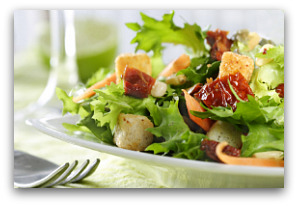- Proper Nutrition

Research suggests that proper nutrition can help keep the mind sharp, the immune system strong and the body healthy. The U.S. Department of Agriculture recommends two to two and one-half cups each of fresh fruits and vegetables daily, as well as seven to eight ounces of whole grains, two to three cups of low-fat or fat-free dairy products, five and one-half ounces of lean protein and no more than six teaspoons of healthy polyunsaturated and monounsaturated oils.
- Limit Calories

Women older than 50 require between 1,600 and 2,200 calories per day, depending on activity level. Men need between 2,000 and 2,800 calories. Excessive calories lead to weight gain, which has been associated with increased risk for hypertension, heart disease and diabetes. Keep calorie consumption under control by reducing sugar and fat, watching portion size and eating several small meals per day instead of three large ones.
- Changing Nutritional Needs

As we age, our nutritional needs change. Seniors often benefit from reduced sodium and fat consumption and increased calcium, vitamin D and fiber. Additionally, because metabolism slows with age, it makes sense to substitute whole foods for processed or refined ones. For example, homemade oatmeal cookies, compared with packaged products, can contain more fiber and less sugar and fat, making them a tasty treat that also offers nutritional benefits.
- Easy Fixes

Creating a healthier diet plan for seniors is easy when you make one small change at a time. You can reduce fat consumption simply by serving fish or chicken in place of beef a few times a week or switching to canola or olive oil for cooking. When eating out, order broiled or grilled entrees. Eat nuts, seeds or fat-free pretzels instead of potato chips. When a few small changes are introduced, the transition is easier, and the results add up quickly.
This website offers the best options on how you can take care of your senior loved ones. They can guarantee the safety and care that you are looking for.
Image Source:
timigustafson.com
vegetarian-diet-tips.com
wordpress.com
Walang komento:
Mag-post ng isang Komento